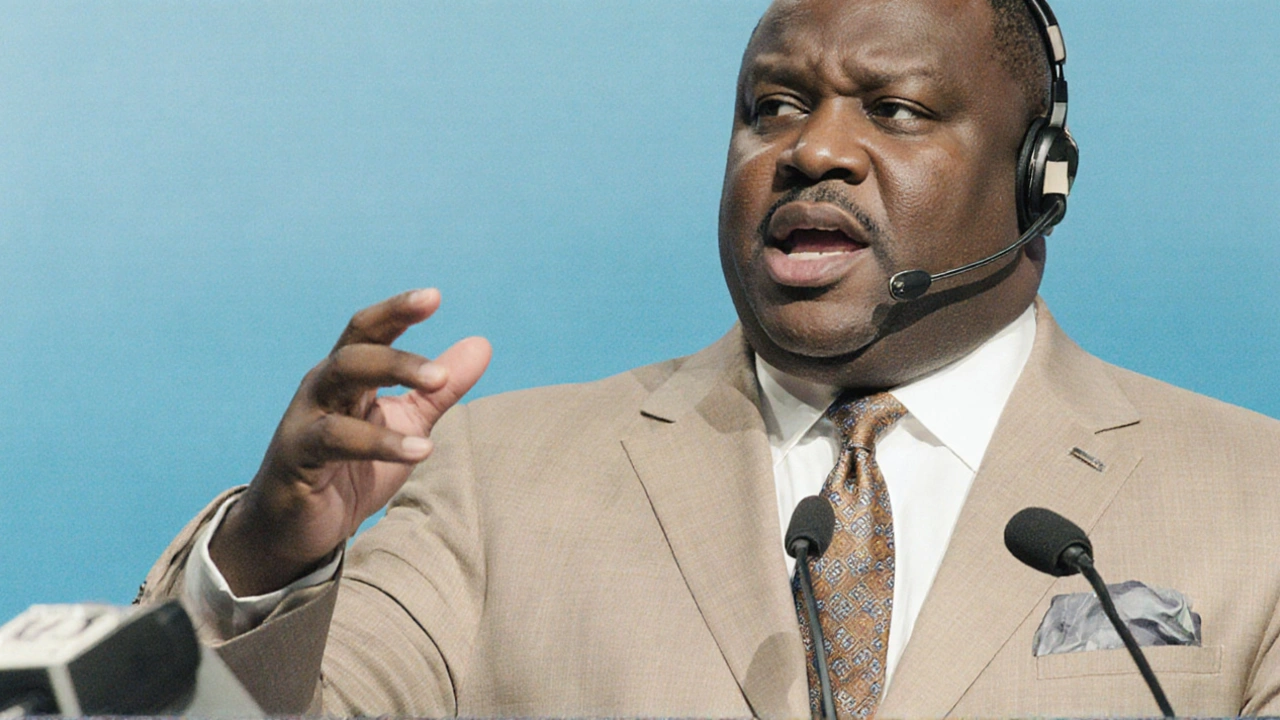Christian Nationalism: Voddie Baucham Calls the Debate a Smokescreen

When Allie Beth Stuckey invited Dr. Voddie Baucham, dean of theology at African Christian University in Zambia, onto her podcast, the conversation quickly turned to the hot‑button phrase Christian nationalism. Baucham didn’t just defend the term; he called it a deliberate “smokescreen” designed to shut down Christians who want to shape public policy.
Why the label is, in his view, a political weapon
Baucham argues that opponents of conservative faith‑based politics have taken a neutral‑sounding phrase and turned it into a loaded accusation. By painting any Christian involvement in governance as extremist, they create a false binary: either you’re a secular‑only citizen or you’re a dangerous nationalist. He points out that this tactic mirrors earlier shifts from “White nationalism” to “White Christian nationalism,” each step meant to split voting blocks and keep believers from organizing.
According to Baucham, the confusion isn’t accidental. He says the term is used to conflate three distinct ideas—traditional Christian political engagement, race‑based nationalism, and a hybrid called “White Christian nationalism.” By lumping them together, critics can dismiss legitimate biblical arguments for moral governance while simultaneously portraying all Christians as a monolithic threat.

What genuine Christian political participation looks like, according to Baucham
The theologian leans on Romans 13 and passages like Romans 2:6‑12 to argue that government exists as a servant of God’s higher authority. He stresses a concept called “sphere sovereignty,” which respects the separate roles of home, church, and state but still encourages believers to be active citizens—voting, mentoring leaders, and praying for officials.
He cites historical examples, from Daniel’s stand against a corrupt ruler to modern‑day local councils that have passed faith‑inspired ordinances. For Baucham, asking a representative government to reflect biblical values isn’t a radical overhaul; it’s a continuation of a long‑standing Christian civic duty.
Baucham also calls out what he sees as a double standard: African nations like Zambia can openly embrace Christian‑inspired policies without facing the same level of media backlash that Western Christians encounter. He suggests the criticism is less about theology and more about protecting a pluralistic status quo that marginalizes overt faith‑based politics.
Finally, the scholar warns that secular critics often wield Scripture themselves to justify policy positions—pointing to Governor Gavin Newsom’s use of religious language to support same‑sex marriage as a prime example. Baucham sees this as hypocrisy: if believers are silenced for citing the Bible, why are secular leaders free to do the same?
Throughout the discussion, Baucham urges Christians not to shrink back in fear of the label. He frames engagement as both a right and a responsibility, insisting that the impact of Christianity on Western freedoms is undeniable and should be proudly acknowledged in the public arena.

Amber Brewer
September 27, 2025 AT 05:50Understanding "sphere sovereignty" helps cut through the label debate. Baucham points out that the biblical mandate in Romans 13 is about submitting to governing authorities, not surrendering personal conscience. When Christians engage in voting, mentorship, or prayer for officials, they're exercising a distinct civic responsibility that the state can't claim for itself. This framework separates church influence from state coercion, which is exactly what many critics overlook when they toss the "Christian nationalism" tag around.
It also shows why lumping all faith‑based activism under a single pejorative can erase legitimate theological perspectives on public morality.
Kim Coulter
October 3, 2025 AT 16:00The smokescreen narrative just masks a deeper power grab.
Michelle Toale-Burke
October 10, 2025 AT 14:40Wow, that podcast really pulled back the curtain on how language can be weaponized 😳. It’s unsettling to see a neutral‑sounding phrase twisted into a political accusation, especially when it silences people who genuinely want to serve their communities. The way the term bundles race, religion, and patriotism together feels more like a fear‑mongering tactic than a fair critique 😔.
We need to keep a clear head and recognize when rhetoric is being used to shut down legitimate discourse.
Amy Paradise
October 17, 2025 AT 13:20Yeah, the emotive pull of those buzzwords can cloud the actual policy discussion 😅. When we focus on the label instead of the substance, we miss the chance to evaluate proposals on their merits.
It helps to step back, examine the evidence, and keep the conversation grounded.
Janette Cybulski
October 24, 2025 AT 12:00I appreciate the clear breakdown of sphere sovereignty-it makes the whole issue feel less abstract. Keeping church, home, and state distinct while still encouraging civic engagement seems like a practical middle ground.
Hope more folks get to see that nuance instead of defaulting to extremes.
Mildred Alonzo
October 31, 2025 AT 09:40Media loves a good scandal and the double standard is obvious the same policies praised in Zambia get harsh criticism in the US the difference is mostly about who is shouting louder the narrative sticks and the nuance disappears. It’s worth remembering that policy outcomes matter more than where the idea originated.
Elizabeth Bennett
February 21, 2026 AT 04:49When we talk about Christian involvement in the public square, the conversation inevitably drifts between theological conviction, cultural identity, and political strategy. Baucham’s warning that “Christian nationalism” functions as a smokescreen resonates because it reveals how terminology can be weaponized to delegitimize a whole segment of voters. Historically, the United States has seen similar patterns when terms like “socialism” or “radicalism” were rebranded to discredit reform movements; the same playbook appears to be in use today. By aggregating three distinct phenomena-biblical civic duty, race‑based nationalism, and a hybrid of the two-critics create a monolith that is easy to dismiss. This tactic not only silences those who want to bring moral perspectives into legislation but also fuels a cultural war that distracts from substantive policy debates. This also points to a deeper concern: the maintenance of a pluralist status quo that privileges a non‑religious narrative while marginalizing overt faith‑driven proposals. At the same time, it is important to recognize that genuine faith‑inspired engagement can be both respectful of pluralism and assertive about moral convictions. Romans 13 does not demand passive acquiescence; it calls for a responsible posture toward authority while maintaining a higher allegiance to divine law. The principle of sphere sovereignty, which Baucham emphasizes, offers a framework that respects the autonomy of church, family, and state without demanding total merger. In practice, that means voting for candidates who uphold life‑affirming policies, volunteering in community outreach, and praying for leaders regardless of party affiliation. The contrast between African nations openly adopting Christian‑inspired statutes and the American media’s hypersensitivity exposes a geographic bias that is too often overlooked. In Zambia, policy aligned with biblical ethics is reported as a natural extension of the nation’s identity, whereas similar moves in the West are framed as a threat to secularism. This double standard points to a deeper concern: the maintenance of a pluralist status quo that privileges a non‑religious narrative while marginalizing overt faith‑driven proposals. Finally, the hypocrisy highlighted by Baucham-secular leaders co‑opting religious language to legitimize progressive initiatives-underscores the need for consistency in public discourse. If scriptural citations are permissible when wielded by those in power, they should be equally permissible when used by believers seeking to influence legislation. The real challenge, then, is not whether Christians should participate in politics, but how they can do so in a way that advances justice without reducing the conversation to branding wars. By moving past the smokescreen of “Christian nationalism,” we can focus on concrete issues like poverty, education, and human dignity, allowing a broader coalition to engage on shared values rather than getting stuck on loaded labels.